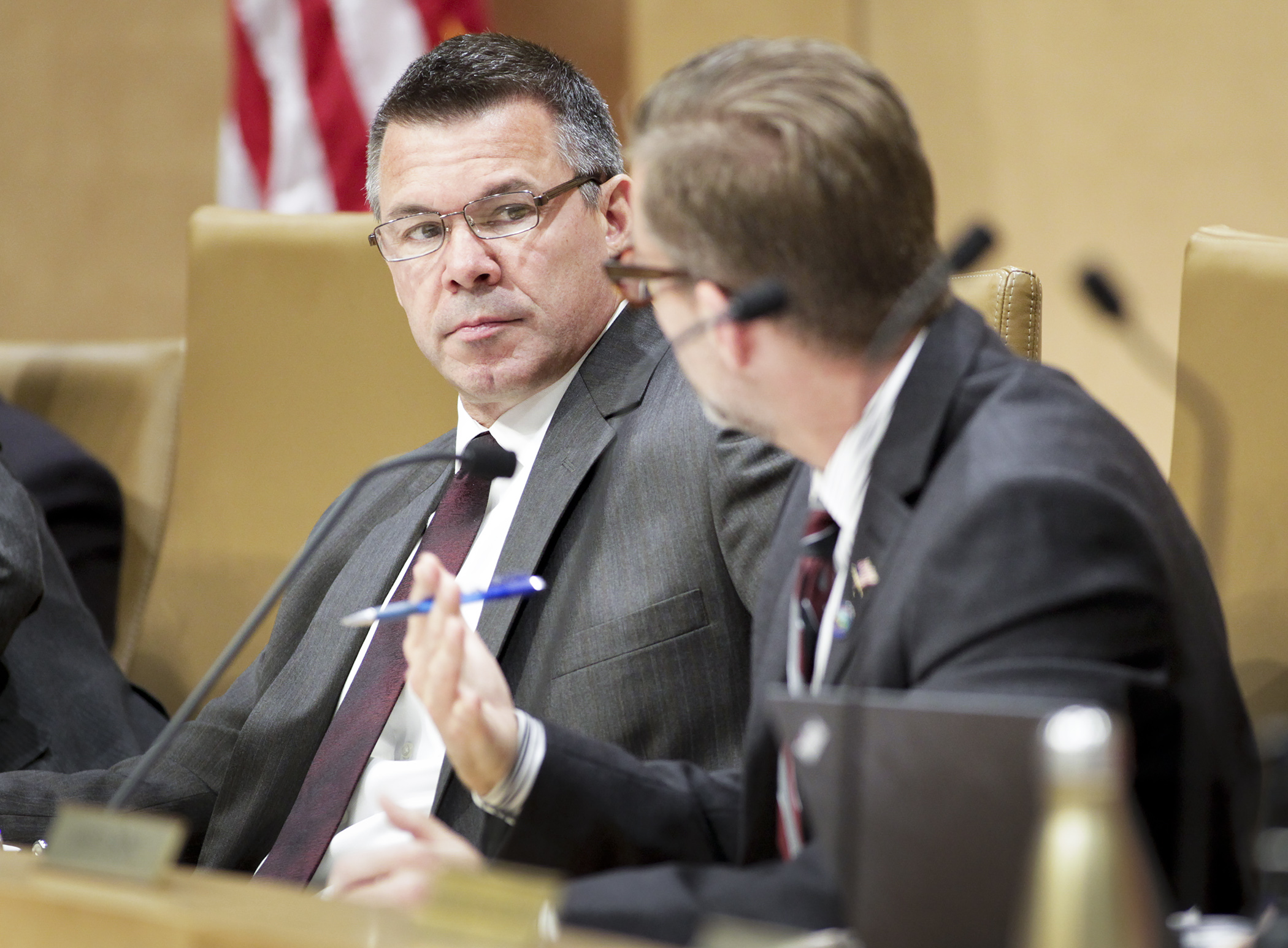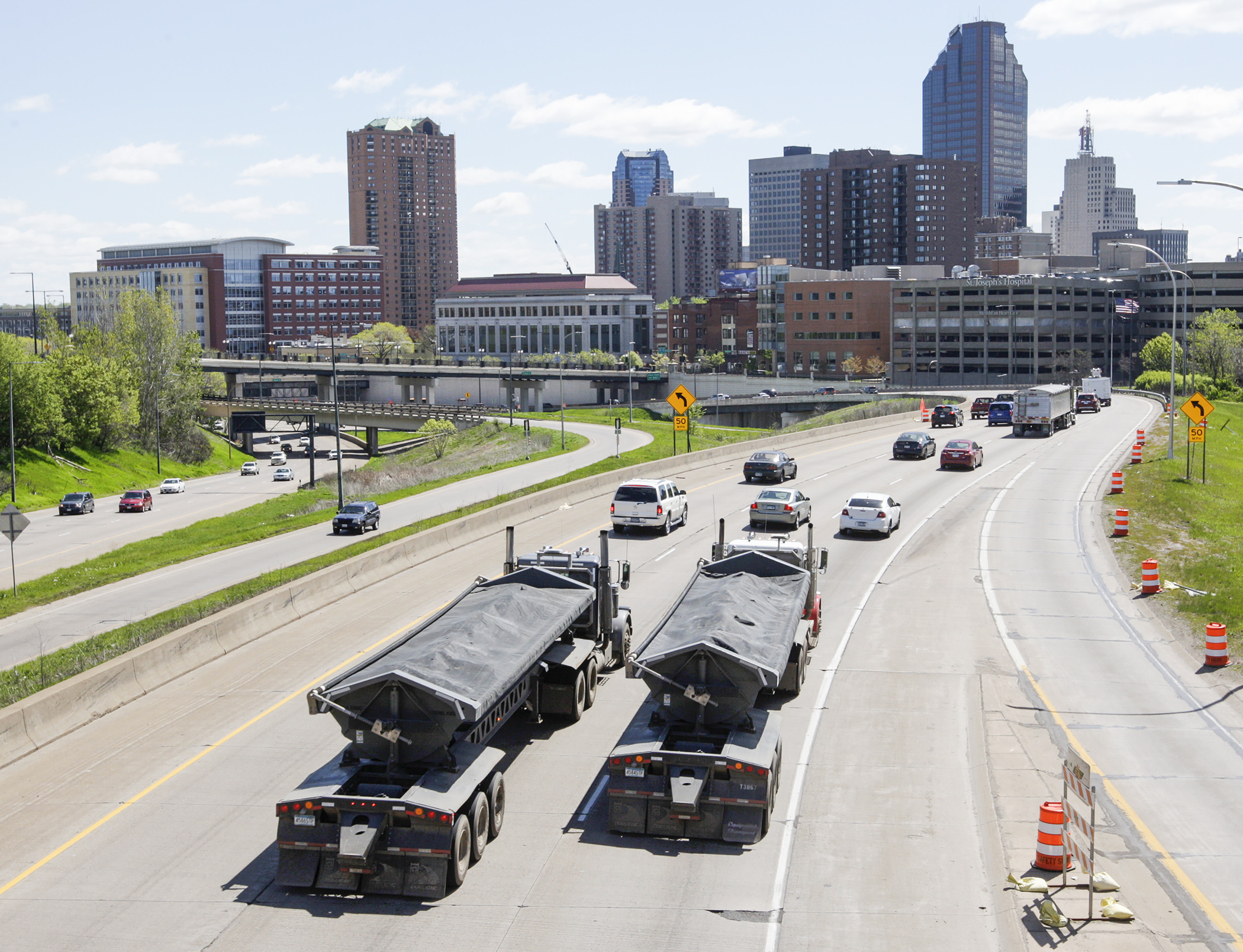Gas tax still divides House, Senate on transportation bill

Senate DFLers on Friday offered to scale back their proposed increase to the state’s gas tax in an effort to find agreement on a long-term deal to expand funding for road, bridge and transit projects.
But with House Republicans still “strongly opposed” to any hike, the conference committee charged with hammering out a deal on the comprehensive transportation plan still appears miles away from breaking the funding deadlock.
Senate transportation committee chair Sen. Scott Dibble (DFL-Mpls) presented an offer to the conference committee on HF4, the omnibus transportation policy and finance bill, which would eliminate the Senate’s proposed excise tax on wholesale fuel and replace it with a 12-cent increase to the state’s existing per-gallon tax.
 Interstate 94 entering downtown St. Paul. Photo by Paul Battaglia
Interstate 94 entering downtown St. Paul. Photo by Paul BattagliaThe Senate position had been to institute a wholesale tax on fuel that would be based on the price of gasoline, not the amount consumed. It would have increased the tax by a minimum of 16 cents per gallon. The new proposal would generate an estimated $758 million in additional revenue between 2017-19 for state, county and local roads, according to Senate staff.
House Republicans didn’t warm to the offer, with Rep. Tim Kelly (R-Red Wing), chair of the House Transportation Policy and Finance Committee, reiterating his caucus’ opposition to any increase to Minnesota’s 28.5 cents per gallon automotive fuel tax. House Speaker Kurt Daudt (R-Crown) this week called any proposal that includes a gas tax hike “unrealistic.”
WATCH Conference committee discusses differences between House, Senate transportation bills
House lawmakers support a plan to provide an additional $7 billion for roads and bridges over the next decade by redirecting motor vehicle-related tax revenue away from the state’s General Fund, identifying efficiencies in the Department of Transportation budget, and utilizing some of the state’s projected $900 million budget surplus.
“We feel very strongly opposed to the gas tax,” Kelly said, “especially with the (budget) surplus situation we are in.”
Other pieces of the Senate offer include:
- $1 billion in trunk highway bonding over 10 years for the state’s Corridors of Commerce and Transportation Economic Development programs, and state road construction;
- a three-fourths of a cent increase in a metro area transit sales tax within the current five-county taxing district to generate an estimated $780 million in additional funding for transit projects in fiscal years 2018 and 2019;
- an increase in license tab fees to collect an extra $458 million in revenue over the next three fiscal years for the state, county and local roads;
- a shift of a portion of the currently-collected quarter-cent metro area transit sales tax for use on metro county road construction projects; and
- $10 surcharges on title transfers and vehicle registrations to generate additional dollars for municipal roads across the state.
Dibble described the Senate plan as attempting to raise dollars in a long-term, sustainable manner, while Kelly said: “All of the sudden it looks like we’re back to raising revenue at every point.”
House lawmakers did appear to shift on the Senate’s push for increased transit funding. Kelly said he agreed transit needs to be involved in a broad transportation package — a departure from the House’s stance when HF4 passed last year — but proposed any additional funding be tied to sweeping reforms to the Metropolitan Council.
Dibble didn’t close the door on such a deal.
“We agree more than we disagree” on Metropolitan Council reform, he said.
Related Articles
Search Session Daily
Advanced Search OptionsPriority Dailies
Ways and Means Committee OKs proposed $512 million supplemental budget on party-line vote
By Mike Cook Meeting more needs or fiscal irresponsibility is one way to sum up the differences among the two parties on a supplemental spending package a year after a $72 billion state budg...
Meeting more needs or fiscal irresponsibility is one way to sum up the differences among the two parties on a supplemental spending package a year after a $72 billion state budg...
Minnesota’s projected budget surplus balloons to $3.7 billion, but fiscal pressure still looms
By Rob Hubbard Just as Minnesota has experienced a warmer winter than usual, so has the state’s budget outlook warmed over the past few months.
On Thursday, Minnesota Management and Budget...
Just as Minnesota has experienced a warmer winter than usual, so has the state’s budget outlook warmed over the past few months.
On Thursday, Minnesota Management and Budget...